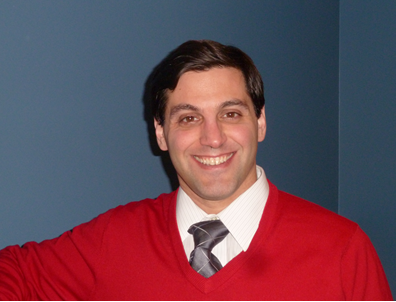
Vasilios (Bill D.) Kosteas holds an M.A. and Ph.D. in Economics from the Ohio State University and a B.A. in Economics from Holy Cross College, Worcester, Massachusetts. When not spending time with his young family and his research, Dr. Kosteas, who joined CSU in 2004, may be found teaching Labor Economics, International Economics, and economic data analysis techniques in the College of Arts and Social Sciences.
1. What do you like most about living in Cleveland, Ohio?
Cleveland has everything you could want in a big city: great restaurants, museums, professional sports teams, but without the high cost of living you usually find in cities with those amenities. One of the area’s best features (and one that is often overlooked) is the Cleveland Metroparks system. My family spends a lot of time in the Metroparks hiking, creek walking, and exploring.
2. What's the most interesting thing you have experienced here lately?
The mushroom ravioli at XO Prime Steaks. Did I mention that we have great restaurants?
3. What attracted you to teaching and to CSU?
I really like the balance between teaching and research. I went to graduate school thinking that I wanted to teach in a liberal arts college (like the one I attended). Somewhere along the way, I discovered that I enjoy research more than I had anticipated. The mix of graduate and undergraduate teaching at CSU is also a strong draw.
4. What is it that most people do not understand about Economics?
People often think of economics as a set of topics, but it is more a way of looking at the world and a set of tools for trying to explain/understand what we see. When viewed this way, you start to understand that Economics can be applied to a wide variety of interesting topics and used to pose some challenging questions.
5. How can a better understanding of economics really improve one's happiness or success?
Economics always reminds you that every choice has a cost. People often forget about the costs and tend to focus only on the benefits. That can lead us into a lot of trouble, on an individual basis and as a society.
6. What is your greatest personal or professional achievement to date?
My two, amazing, little sons. Nothing I do professionally could ever compare to the joy of watching them as they begin to grow into inquisitive and kind people.
7. Tell us about your current research projects and aspirations.
I currently have an NSF proposal under review. It is multidisciplinary project with colleagues from Teacher Education and Psychology. We’re proposing a survey design that will allow us to investigate the role played by identity and teacher education program features in explaining teacher job satisfaction and turnover, with an emphasis on how identity might interact with economic factors such as relative pay.
My co-author Francesco Renna (University of Akron) and I are working on project that follows up on our recently published paper that investigates how much of the monthly premiums for their employer sponsored health insurance plans firms decide to pass on to employees. Finally, I’m also continuing my work examining the determinants and labor market impacts of regular exercise.
8. In your opinion, what is the most important trend that you watch regularly?
Wage and employment growth. While the jobs reports in recent months have shown solid headline numbers, the growth is not in the areas we would like to see, and this has been reflected in the sluggish wage growth numbers. These trends will have to change if we want to see a more robust recovery.
9. Do you agree that the U.S. remains in a slow stage of economic recovery?
It certainly has been slow from a labor market standpoint. Of course, recessions caused by a financial crisis can have slow recovery periods. Part of the sluggishness is due to the incredible amounts of new rules and regulations created by major pieces of legislation (like the Affordable Care Act and the Dodd-Frank Bill) and federal government agencies. We have to bear in mind that smaller companies tend not to have their own legal departments. The uncertainty created by these bills has an especially profound effect on these firms. In fact, Congress had to go back and amend the Dodd-Frank bill after recognizing that it put small community banks at a big disadvantage compared to national banks. Another part of the slow recovery can be chalked up to the fact that households are paying down debts, and that’s a good thing. The big questions are when the student loan bubble will burst and how badly that will affect the economy.
10. What's the most surprising comment you have heard lately from a student?
Just last week a student told me I have too much faith in today’s youth. This was an undergraduate student, by the way.

